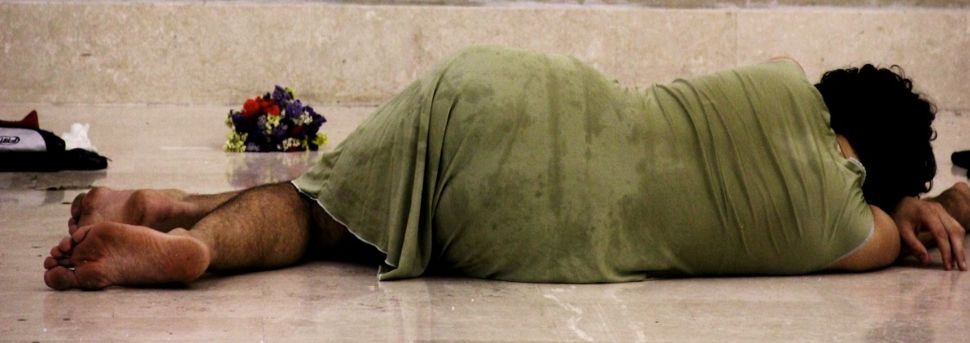text, direction, setting and costumes Angélica Liddell
with Joele Anastasi, Ugo Giacomazzi, Fabián Augusto, Julian Isenia, Lola Jiménez, Andrea Lanciotti, Angélica Liddell, Antonio L. Pedraza, Borja López, Emilio Marchese, Antonio Pauletta, Isaac Torres, Roberto de Sarno, Antonio Veneziano
Ukranian choir free voice Lytvynenko Mykhailo, Landar Anatolii, Levdokimov Oleksii
light Carlos Marquerie
sound Antonio Navarro
costumes Pipa & Milagros
bonnets Carolina Rivas
technical directorMarc Bartoló
stage manager Julio Provencio
production and logistics Mamen Adeva
direction assistant Julio Provencio
production manager Gumersindo Puche
lights technicians Octavio Gòmez
executive producer Iaquinandi, S.L.
associate producer Prospero (Théâtre National de Bretagne – Rennes, Théâtre de Liège, Emilia Romagna Teatro Fondazione, Schaubühne am Lehniner Platz, Göteborgs Stadsteater, World Theatre Festival Zagreb, Festival of Athens and Epidaurus)
co-produced by Odéon-Théâtre de l’Europe, Festival d’Automne à Paris, deSingel Internationale Kunstcampus, Holland Festival – Amsterdam, Le-Parvis Scène Nationale Tarbes Pyrénées, Comédie de Valence – Centre dramatique national Drôme-Ardèche
supported by Comunidad de Madrid, Ministerio de Educación, Cultura y Deporte – INAEM
heartfelt thanks to Àlex Rigola and Biennale di Venezia for making the meeting with the actors possible. This play would have never existed without them.
Played in Spanish and Italian
National Première
Running time 2h 15′
For the first time in Italy in 2011 just at VIE, where she presented Te haré invencible con mi derrota, the Catalan artist Angélica Liddell comes back to Modena to introduce You are my destiny (The rape of Lucrezia). Angélica Liddell is the most unconventional and unpredictable actress, director, author and poet of the international contemporary scene: beloved by critics for the physicality and expressiveness of her performances, in July she received at Biennale Teatro Venezia the “Leone d’Argento” for theatrical innovation. “For her ability to translate the performing arts on the theatre”, this was the motivation of the jury that continued “For her theatre of resistance. For the quality of her writing, able to turn her lyrics into a poetry that cries out of the world and her own soul. For her efforts as a performer and actress. To have erased the borders between the different genres and styles of art, making sure that the mixture of words, images, sounds, music, play, drama, the funny and the tragic make a whole. For being one of the European artists of her generation with the largest spread in the world of performing arts. For its complaint and continuous attention to the weaknesses of human beings. Due to continued communication with the public and to the pursuit of knowledge of other cultures and forms”. Presented in a studio’s form in Venice, Angélica Liddell will stage at VIE The rape of Lucrece, an international production within the Prospero Project on the poem written by William Shakespeare. In addition to the Shakespearean text, the Catalan artist draws inspiration from the ‘Storia di Roma dalla sua fondazione’ by Tito Livio as well as the use of ritual and medieval miniatures of the director Sergej Paradžanov. From the scene a new perspective on the story of Lucrece will emerge: Angélica Liddell does not investigate on her rebellion according to the image of Lucrece the story wanted give us. The artist explores instead the woman who commits suicide to defend her virtue and honor. The play does not want to be a feminist manifesto, but rather the story of a love and a passion that go beyond death. Desire and suffering, love and rape, suicide and revenge: these are the central themes of You are my destiny.
Whenever The rape of Lucrece is represented in theatre it is done from the most plain and simple perspective; from a political viewpoint, either as a symbol of the fall of the tyrants or as a symbol of the abuse suffered by women in the hands of man. The figure of Lucrece is used to talk about the fair and the unfair, but the convulsions of the soul have nothing to do with justice. Justice defines social order, but weakness defines human nature, and in this sense this Lucrece is a recognition of the weakness of human beings beyond the fair and the unfair. I am not interested in social order, but in the disarray of feelings, in understanding the relationship between desire and pain. Something we cannot yet manage to explain happened in Venice. Maybe destiny gathered us there to stab the same body. Each had his own reason to stick the knife in. We were strangers murdering one body, piercing the same corpse, each willing to keep silence on the other’s stab, accomplices of a crime; in silence, respecting each thrust of the knife. We had a corpse at our feet and a beautiful secret in our hearts. Even if I knew with certainty that any of these men have one hundred severed heads in their conscious, I would never judge him, and I would keep the secret by cutting one more head off with my sword, adding my decapitated to his decapitated. It was in this way how Tarquin’s pardon came about. A man debilitated by beauty and the weight of the world. I forgave Tarquin through my love towards my men. This Lucrece remains standing thanks to two simple movements, heirs of Empedocles, love and strife. Or thanks to Democritus, who supported that in the very beginning there were numerous human and animal body parts haphazardly distributed: legs, eyes, arms, mouths. Random combinations were formed with these roots through love or attraction, spawning abhorrent and unviable creatures which would never survive. In this way neither Lucrece nor Tarquin survived the attraction. Fate becomes once more destiny. The abhorrent and unviable becomes the truth facing the hypocrisy of social order. “The wars between divinities and between men, fate, fatality, natural disasters. All these obstacles affect the total and profound man. They brush aside the false dilemmas of the civilized man” says Nanaqui.
Angélica Liddell



